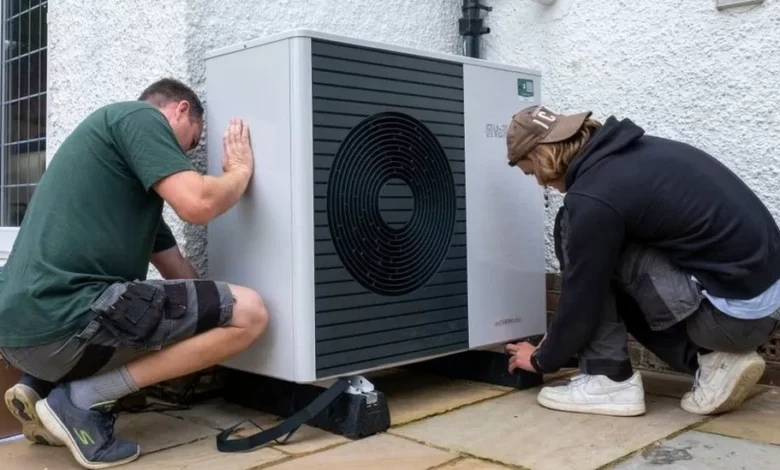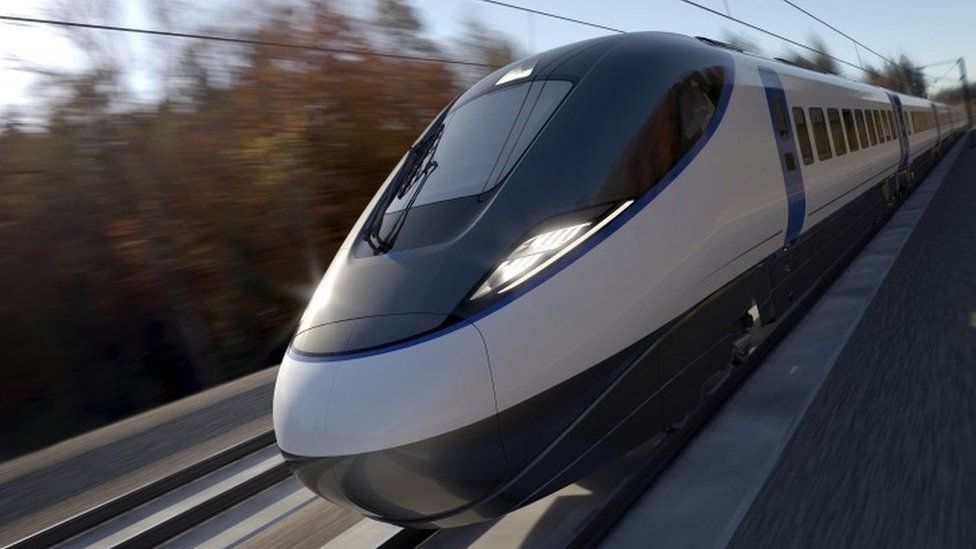Call for more help on heat pumps to meet net zero target

The government needs to vastly expand subsidies for heat pumps in order to meet net zero goals, a group of independent advisers have warned.
The National Infrastructure Commission (NIC) said pumps were not being installed fast enough and questioned the prime minister’s carbon pledges.
More money is also needed for urban transport, it said.
The government said it would deliver the transport “that matters most” and take a pragmatic approach to net zero.
Net zero means no longer adding to the total amount of greenhouse gases, such as carbon dioxide (CO2), in the atmosphere. CO2 is released when oil, gas and coal are burned in homes, factories and to power transport, and it contributes to an increase in global temperatures by trapping the sun’s energy.
Under the 2015 Paris climate agreement, 197 countries – including the UK – agreed to try to limit global temperature rises to 1.5C by 2100.
To achieve this, scientists say that net zero CO2 emissions should be reached by 2050.
The NIC, a group which advises the government on the infrastructure challenges the UK is facing, said around eight million buildings will need to switch from gas boilers, which currently heat around nine in 10 properties in England, to cleaner alternatives by 2035 to meet the UK’s 2050 net zero target.
It said heat pumps and heat networks were “the solution” and being “deployed rapidly in other countries”.
A heat pump is an electrically-powered device which absorbs heat from the air, ground or water around a building. For example, air-source pumps suck in outdoor air and pass it over tubes containing refrigerant fluids to produce heat.
However, in a report setting out its recommendations for the next five years, the commission said that the current rate of heat pump installation in the UK was “not cutting the mustard”.
It comes after Rishi Sunak last month relaxed a plan to phase out the installation of gas boilers by 2035, instead aiming for only an 80% phase-out to save households money.
Critics accused him of watering down the UK’s net zero plans, but the prime minister pledged the country “will still meet our international commitments and hit net zero by 2050”.
NIC chairman Sir John Armitt said he found it “hard to accept” Mr Sunak’s assurances.
“We’ve got a 2035 target [on boilers] which is only 12 years away,” Sir John told reporters.
“I find it hard to accept that we are likely to meet that when we are installing 50-60,000 heat pumps at the absolute most per annum at the moment when the government has set itself a target of 600,000 heat pumps per year by 2028.”
Currently, homeowners can apply for a £7,500 grant to install a heat pump under the government’s Boiler Upgrade Scheme, but there are a limited number of grants and the scheme only receives £150m of funding annually.
The commission said this needed to be vastly expanded to around £6bn a year, so that the poorest households could have the cost of installation fully funded.
All other UK property owners should be eligible to claim a £7,000 subsidy to put towards the installation of an electrified heating system, it added. Zero per cent financing options should also be available to help with costs beyond the subsidy threshold.
Officials at the Department for Energy Security and Net Zero said it was incentivising investment in the heat pump market, providing up to £30 million to support UK manufacturing in a bid to make the switch a more “attractive choice” for consumers.
Some £6.6bn is being put into clean heat and energy efficiency, with a further £6 billion of new funding from 2025, the department added.
‘Significant deficiencies’
The NIC report said that while UK infrastructure performed well “in some areas”, there were “significant deficiencies” holding the country back.
It said no major reservoirs for water supply had been built in England in the past 30 years and recycling rates have “not increased in a decade”.
It also called for more to be done on transport, after the Birmingham to Manchester leg of HS2 was scaled back earlier this month.

The NIC said it left “a major gap in the UK’s rail strategy” and called for a “comprehensive, long-term and fully costed plan” to address capacity and connectivity issues in the North and Midlands.
The Department for Transport should also invest £22bn to improve public transport in Birmingham, Bristol, Leeds and Manchester to tackle congestion and boost economic growth, the report said.
A government spokesperson said: “Our Network North plan will deliver the transport that matters most to people and we’re adopting a fairer and more pragmatic approach to meeting net zero that supports households and families to make greener choices whilst easing the burdens on working people.
“We are delivering over £600bn of planned public sector investment in infrastructure, R&D and defence over the next five years, including an unprecedented package to improve connections in our city regions and billions to decarbonise buildings”.










